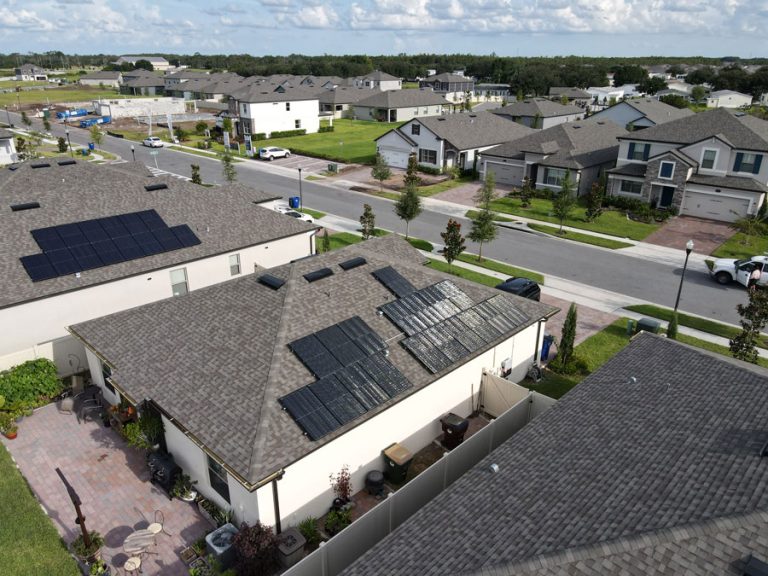
There is something amiss in the Florida home insurance situation. Some insurance companies are reportedly dropping Florida homeowners as clients because they installed solar panels in their homes.
According to First Coast News, there are currently more limited choices of insurance companies that cover homes with solar panels in Florida. Also, several companies that did cover structures with solar panels are no longer writing policies in the state.
And if you decide to install solar panels while applying for home insurance, the insurance company will at a minimum, change the terms.
What’s going on?
Solar Energy in Florida
First, let’s talk about the state of solar energy in Florida. It’s called the Sunshine State for a reason: it’s almost always sunny. It makes sense that it has the third highest number of solar energy systems installed in the country at 10,111 megawatts.
According to the Solar Energy Industries Association (SEIA), Florida’s solar energy is enough to power more than 1 million homes and has generated more than 11,000 jobs. There are currently 461 solar companies in the state, and Joe Does Solar is among the trusted names in the industry.
As a result of the booming solar energy industry in Florida, prices of solar panels and other components in home installations have significantly dropped. And this will likely entice even more homeowners to go solar.
But not if insurance companies are no longer covering homes with solar panels.
Why Insurance Companies Are Canceling Policies
In the First Coast News report, an insurance agent said companies don’t want to cover homes with solar panels because some Florida Power & Light (FPL) contracts state that any damage caused by solar panels will be charged to the homeowners. The financial burden will then be passed on to the insurance company.
As a result, some home insurance companies are reportedly canceling policies when homeowners sell their extra power from the solar panels back to the electric company, known as net metering.
There is also a claim that solar panels cause damage to homes and the utility grid, but Heaven Campbell of the nonprofit Solar United Neighbors debunked this myth.
Campbell says it is odd that a billing methodology would be the reason why insurance companies are backing out from providing fair insurance coverage. She calls the situation “fishy” and assures Florida homeowners that Solar United Neighbors will investigate the matter.
FPL Courts Politicians to Curtain Rooftop Solar Incentives
Solar energy may be good for the environment and offer homeowners many benefits, but it isn’t good for FPL’s bottom line. FPL, the biggest utility provider in Florida, is allegedly trying to renege on net metering. Despite that, according to the Tampa Bay Times, only 1% of Florida’s FPL customers participated in net metering.
After voters in the state voted down several attempts by the utility companies to make it harder to go solar, they then turned to the state legislatures directly.
According to a report by the Miami Herald, FPL allegedly drafted a bill that State Senator Jennifer Bradley filed in November 2021. It would prevent business owners and homeowners from offsetting their energy expenses through net metering. State Rep. Lawrence McClure also filed an identical bill before the House. (They both then had donations made by FP&L into their political fund accounts) This legislation passed both Florida and Houses but was vetoed by Governor Desantis.
But these legislative attempts to make it less cost-effective for homeowners to go solar may have profound implications for the growth of solar-powered homes in the state. Even though most all legislation included clauses for “grandfathering in” existing solar owners and delaying implementation for a few years, some utility players in other states may follow suit, which would affect green homes across the country.
SEIA Southeast Regional Director Will Giese said the legislation is intended to allow FPL to continue its monopoly on the energy market—FPL serves 65% of the state’s population.
On the part of FPL, spokesperson Chris McGrath stated that the company does not oppose net metering. However, they are asking for changes in the law as it is poised to lose $700 million in the span from 2019 to 2025. How does 1% rooftop solar translate into a $700 million loss?
Insurance Companies Are Complaining, Too
Florida insurance companies admit they weren’t ready for the popularity of solar energy in the state. Some of them thought they could handle it and decided to offer coverage for homes with solar panels.
Among the issues involved in covering solar panels in homes is that holes drilled into roofs can become an insurance headache. Florida faces high roof replacement costs because of hurricanes.
There is also an issue of liability when the electrical system is damaged during or after solar installation.
For example, an insurance company refused to renew coverage for Pinellas couple Barry and Cathy Taylor due to solar panel installation. The couple sought the help of Tampa’s News Channel 8 to raise awareness as they were confused about why they were dropped from the insurance company. A different insurance company offered to provide coverage but asked for double the initial premium. Issues like these, appear to be much less unlikely further inland.
Are FPL and Insurance Companies Colluding Against Solar Companies and Florida Homeowners?
It seems like FPL and insurance companies have similar goals of reversing the demand for more green homes in Florida.
While homeowners in the state are doing their part to build environmentally friendly homes, FPL and insurance company earnings are on the downswing. FPL claims to be losing millions from net metering (while still making record profits), while insurance companies fear liability clauses in covering homes with solar panels.
Utility companies are meant to ensure everyone benefits from electrification, but in the case of Florida, its biggest utility company is allegedly attempting to do the opposite. There has already been at least one class action lawsuit regarding collusion between Florida utilities and solar. While currently there is no airtight proof that the same is happening with Florida insurance companies, certain similarities easily lead to speculation that there may be class action lawsuits against that industry in the future.
Green Effort Must Be Lauded, Not Scalded
More than 100,000 Florida homes have rooftop solar installations. While this is roughly 1% of all residences in the state, Florida is leading many states when it comes to the percentage of homes with solar panels. Floridians are enthusiastic about solar power because it’s good for the environment and offers significant long-term financial savings, plus net metering is an added incentive.
Switching to renewable energy at home could reduce a household’s carbon footprint by up to 2.5 tons annually. Homeowners with rooftop solar panels are contributing to our clean energy future, and utility companies, state governments, and insurance organizations should promote increased adoption of solar energy.
If you’re ready for expert help to start your due diligence regarding solar, contact Joe Does Solar for a consultation. We’re now serving most of Florida.

